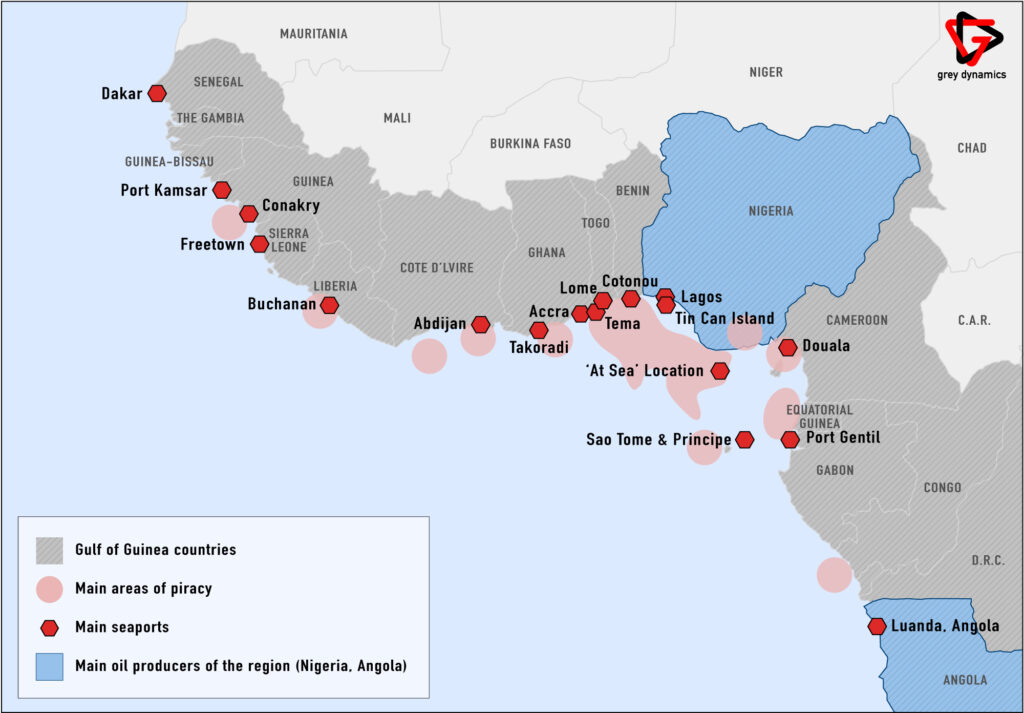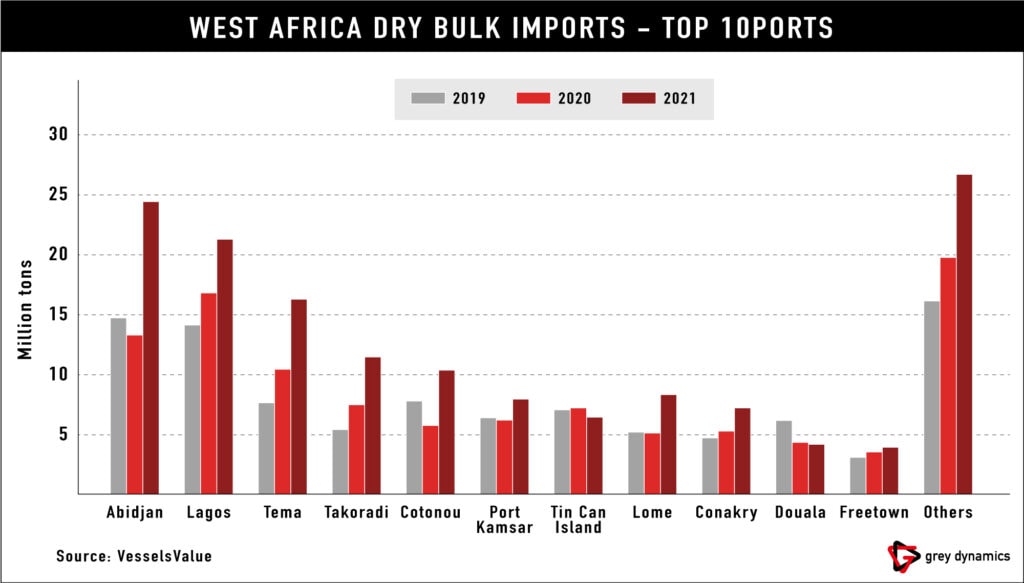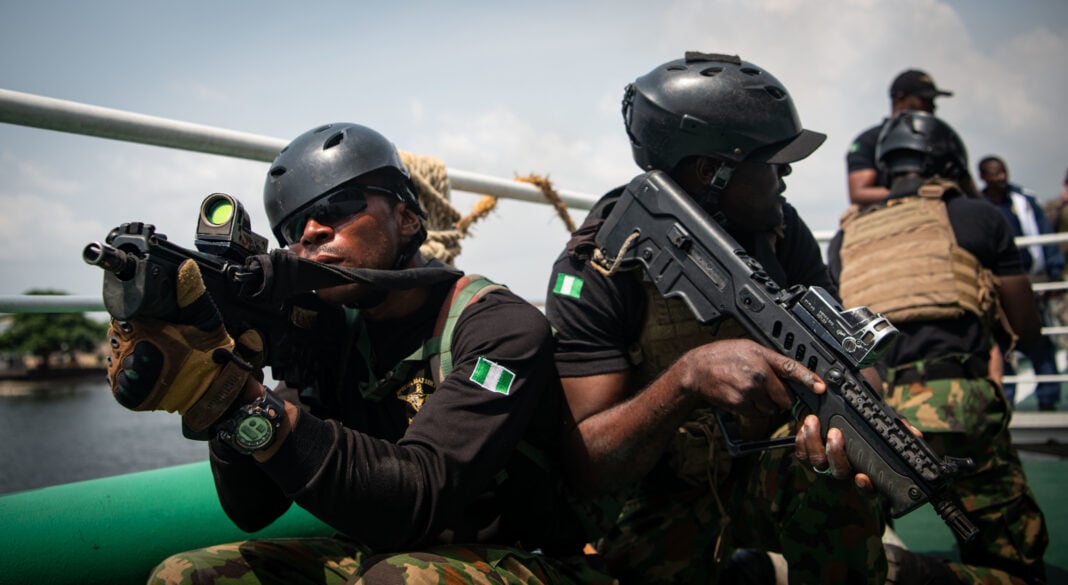Maritime criminal activity in the Gulf of Guinea has transformed over the last decade, shifting from piracy to oil bunkering. Several factors underpin the reduction of piracy incidents, including enhanced naval patrols and improved cooperation. Yet, illegal oil bunkering and pipeline vandalism are at an all-time high.
1. The Gulf of Guinea: A Strategic Area
The Gulf of Guinea’s geographical position makes it a strategic hotspot for maritime crime. The region has therefore overtaken the Gulf of Aden and Somalia as the leading global piracy hub.
17 countries, from Senegal to Angola, from the Gulf of Guinea. The region is richly endowed with large reserves of natural resources such as hydrocarbon, minerals and fishery resources (source). The Gulf of Guinea represents 25% of African maritime traffic, with nearly 20 commercial seaports.
Most importantly, the Gulf represents 60% of Africa’s oil production. Two-thirds of the reserves are concentrated within Nigeria’s exclusive economic zone (source). The region is home to 4.5% of worldwide proven oil reserves, 2.7% of proven natural gas reserves, and around 4% of global fish production (source). The Gulf of Guinea’s GDP was $866.343 billion in 2021. This represented 45% of sub-Saharan Africa’s GDP. Finally, the Gulf is the primary access to and from Africa’s first and second largest oil producers, Nigeria and Angola (source). Nigeria is often pictured as the centre of gravity of the region. Its oil sector accounts for 75% of the state’s revenue and 90% of its total exports (source).

2. Piracy vs. Bunkering
2.1 Piracy
Under international law, piracy “threatens maritime security by endangering (…) the welfare of seafarers and the security of navigation and commerce. These criminal acts may cause the loss of life, physical harm or hostage-taking” situation. They often cause direct and indirect significant disruptions of commerce and navigation (source).
Article 101 of UNCLOS considers the following acts as piracy: “Any illegal acts of violence or detention, or any act of depredation, committed for private ends by the crew or the passengers of a private ship or a private aircraft and directed (source):
- On high seas, against another ship or aircraft, or against persons or property on board such ship or aircraft
- Against a ship, aircraft, persons, or property in a place outside the jurisdiction of any State.”
While the definition is limited by its geographical scope, article 58(2) of UNCLOS extends piracy jurisdictions to exclusive economic zones (EEZ) of any state. Hence, acts of piracy committed on a State’s EEZ are to be treated as if committed on the high seas.
2.2 Bunkering
On the other hand, bunkering refers to acts involving oil theft. These include the diversion and smuggling of oil and unauthorised loading ships. One common process requires the tapping into an oil pipeline, and the transportation of the oil elsewhere. The oil is then sold internationally or refined locally. A small group of welders often puncture the pipeline at night, establishing a tipping point from which the group can operate.
Such endeavour results in regular oil spills and explosions, leaving pipes vulnerable to leaks, spills, and major incidents (source).

2.3 Human, Environmental and Health Security
Oil bunkering and piracy present substantial risks to the human, environmental, and health security of the local populations. Indeed, the degradation of the environment due to oil spills and explosions had reduced land arable for farming. Oil leaks also devastated the fishing communities through the pollution of water (source).
Nigeria has witnessed an unprecedented surge in oil bunkering. It significantly crippled the country’s oil industry. The production in the months of August and September plummeted below one million barrels per day (bpd). This was its lowest level in decades (source). Similarly, pipeline leaks in Nigeria left two third of the population without access to clean drinking water (source).
The combined impact of climate change, illegal, unreported and unregulated fishing and the environmental degradation of delicate ecosystems has destabilised and impoverished local populations. It curtailed their access to their primary sources of income and nutrition. Regional governance and security concerns increase the risk of coastal communities taking part in criminal activities (source).
These concerns accentuate the already rampant amount of transnational illicit trafficking, facilitated by porous borders. In Nigeria, where an estimated 120,000 barrels of crude oil are stolen each day, fuel and crude oil theft and smuggling pose major problems. This represents nearly 6% of Nigeria’s output (source).
3. The Shift
The Gulf of Guinea has witnessed a shift in the dynamics of piracy, with criminal networks moving away from targeting commercial maritime and switching to oil bunkering. Piracy in the Gulf of Guinea emerged around 2005 when militant groups in the Niger Delta attacked oil and gas infrastructures. At that time, most of the incidents were classified as “boarding and robbery”. Between 2005 and 2009, only 15% of reported incidents were “kidnapping for ransom”. From 2010 to 2015, pirates mixed kidnappings and hijacking, primarily targeting tankers loaded with refined products. From 2016 to 2021, pirates altered their pattern of action, shifting towards kidnapping for ransom, primarily due to the fall of oil prices. Yet, since April 2021, the number of incidents of maritime crime has dropped. For instance, only eight cases of maritime crime were recorded in the last quarter of 2021 (source).
3.1 Regional and International Cooperation
This shift might be due, in part, to the implementation of the Yaoundé Code of Conduct, signed in June 2013. The code promotes information sharing and reporting. It also fosters the interception of suspicious vessels, ensuring apprehension and prosecution. Finally, it aims to harmonise regional legislation and to guarantee the allocation of resources to maritime security by outlining state responsibility to patrol anchorage areas (source). Simultaneously, regional and international cooperation, through joint military operations, aims to deter piracy activities (source). Several factors, such as the positive impact of piracy convictions in Nigeria and Togo since July 2021, underpin the reduction in piracy incidents in the Gulf of Guinea. Increased naval patrols by the Nigerian Navy, coupled with improved cooperation with regional counterparts also participate in the decrease of piracy (source).
3.2 Financial incentives
Moreover, financial incentives motivate this shift. Piracy and kidnapping for ransom totalled around $4 million in 2021. On the other hand, illegal oil bunkering is a multi-billion-dollar industry (source).
The region’s maritime affluence attracted non-state actors lacking economic opportunities elsewhere. Regional corruption, high levels of unemployment and the lack of good governance render illicit activities such as oil bunkering more attractive.
4. Not enough?
However, current efforts are not sufficient. Maritime insecurity and oil bunkering incidents remain prominent in the region.
4.1 Need for more cooperation
One of the main obstacles to the effective suppression of piracy in the Gulf of Guinea derives from the fact that several States in the region have not effectively integrated the crime of piracy and its universal jurisdiction in their domestic. Less than one-third of the Gulf of Guinea countries have enacted legislation to criminalise maritime criminal activities (source). The full operationalization of the structures of the Yaoundé Architecture remains hampered by the lack of sufficient human, technical, logistical and financial resources (source).
Meanwhile, the Gulf of Guinea Commission (GGC) faced some challenges. The Commission highlighted the lack of timely response to issues of concerns raised by the commission, the inability to hold important meetings due to lack of participation, and the lack of payment of dues as major concerns (source).
The US and the EU could also benefit from greater cooperation in the Gulf of Guinea, especially in terms of training and equipment of local navies. It could help counter China’s increased capacity-building assistance in the region. Indeed, Beijing delivered modern patrol boats to local navies, consequently strengthening its influence in the region (source).
4.2 Need for technological developments: AI and maritime security.
Finally, the region could greatly benefit from improved technological equipment, whether vessels or maritime surveillance platforms such as drones and radars (source).
The use of artificial intelligence could also enhance maritime safety. AI could be used to optimise business operations and the detection of suspicious activities, and aid infrastructure maintenance. The fast generation of insights through the analysis of various variables could facilitate the fight against oil bunkering and piracy (source).
5. Summary
Hence, the Gulf of Guinea has witnessed a shift from piracy to oil bunkering. Despite attempts of regional cooperation, several local factors hinder the full implementation of efficient mechanisms. Moreover, the decline of piracy does not necessarily imply the improvement of maritime security in the region. Therefore, local and international actors should continue their efforts to counter maritime criminal activities and oil bunkering. More than the direct human and financial cost it generates, these criminal activities have the potential to considerably hinder the region’s development.

